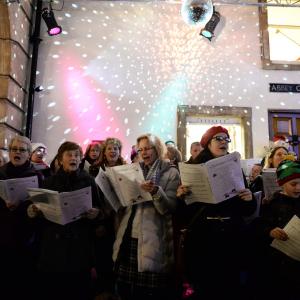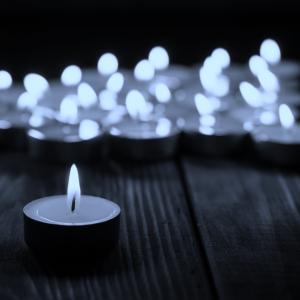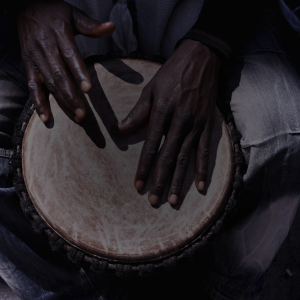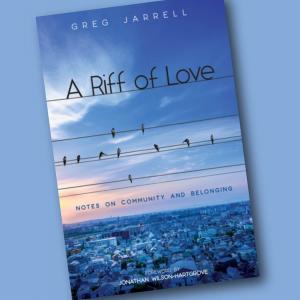
Brandon Wrencher is pastor of Blackburns’ Chapel United Methodist Church and director of The Blackburn House in Todd, N.C. He also serves as a provisional elder in the Western North Carolina Conference of the United Methodist Church. He has written for The Other Journal, Missio Alliance, and other publications.
Posts By This Author
Healing From Empire
A review of ‘A Riff of Love: Notes on Community and Belonging,’ by Greg Jarrell.
BLACK AND BROWN folks have discussed at great length white supremacy and empire, but unless white folks have the conversation, those demons will never be fully cast out of our lives. White folks have become content with a lifestyle that hovers above black and brown folks and doesn’t dive into the white supremacy and empire that threatens them.
But Greg Jarrell, author of A Riff of Love: Notes on Community and Belonging and a self-described “white, middle-class, highly educated, straight man,” departs from this pattern. Jarrell plunges into the issues, examining the story of his family’s more-than-a-decade-long journey of building QC Family Tree, an antiracist spiritual community of people in solidarity with black folks experiencing gentrification and displacement in the Enderly Park neighborhood of Charlotte, N.C.
Jarrell, who plays saxophone, frames the book around the concept of riffs, which he describes as “a few notes ... the essence of the full melody, the foundation from which a whole work is constructed.” Some of the greatest jazz arrangements begin with a riff, born of careful attention to a melody and improvisation on a theme.
Living the Word: World's About to End?
Reflections of the Revised Common Lectionary, Cycles C & A

Joseph Sohm / Shutterstock
WITH SO MANY dust-collecting pews, judgment is not the theme on most religious leaders’ lips. The audience that took seriously the “signs of the times” is typically in nursing homes and cemeteries. Millennials and Gen-Xers find the subject distasteful at best, a fairy tale at worst. I’m not sure there’s any way to shirk the theme in this season. Judgment is on the lips of God. We better find ways to take God’s word seriously. And this word of judgment is for all people, no matter your generation.
God’s judgment is always twofold: a word against those who withhold justice and equity from communities on the margins, and a word of blessing promising those on the margins that shalom is already here and yet to come.
Still, God’s judgment is never abstract or vague; it is directed to particular people and communities. We have to search for those places in our own communities where justice and equity, where God’s shalom, is held hostage for the few.
Focused on one set of the many injustices in our world, the Black Lives Matter movement has sustained a witness for justice and equity for four years now. This movement is part of a long tradition and contemporary global movement for the liberation of black and brown lives. Calling out white supremacy is a prerequisite to taking God’s word seriously. White fragility and guilt will have to be exorcised. Black and brown assimilation to whiteness will need to be lovingly named. The vision of God’s future will keep us on this path. Our work in these weeks is continuously to call forth God’s vision of shalom for all people through the flourishing of black and brown lives.
[ November 6 ]
Resisting Whiteness
Job 19: 23-27a; Psalm 17:1-9; 2 Thessalonians 2:1-5, 13-17; Luke 20:27-38
Living the Word: Called to Wait

Living the Word: Off-the-Grid Spirituality

SpeedKingz / Shutterstock
There’s no standout theme that can be traced through October’s lectionary, which means that teaching and preaching will not be able to rely on the nice packaging of cool titles and catchy series. And those reading devotionally should not expect pet clichés. I suspect we need seasons of spirituality that are off the grid. It reminds me of my friends that live almost completely off the land. They are hard to track, but they maintain an abiding centeredness. Their keen sense of attention to their surroundings and their own bodies is unparalleled, because they have to anticipate both nurture and nature, rhythm and surprise, order and spontaneity.
We will need to be ready for no less surprises, twists, and turns in the lectionary for this month. We will also need the centeredness to act and lead. Scripted leadership and lessons won’t cut it. Improvisation is the skill to cultivate. Samuel Wells offers a framework that will guide us: “Improvisation means a community formed in the right habits trusting itself to embody its traditions in new and often challenging circumstances ... this is exactly what the church is called to do.”
This is the way of wisdom – a far cry from the pop Christianity of our day that offers formulas and platitudes.
Living the Word: No Ordinary Life
Reflections from the Revised Common Lectionary, Cycle C.

Andrey_Popov / Shutterstock
ORDINARY TIME CONTINUES, in this season after Pentecost. The designation “ordinary” always strikes me as odd. This season is anything but ordinary in the common way in which we use the term. Ordinary typically means that something has no special or unique characteristics. Ordinary is simple, average, unexciting.
In one sense, the lectionary passages can be described as ordinary. There are no mighty battles or astonishing miracles or dreamy visits from God. The text is full of practical teaching, of how to live out the life of faith. Ordinary, right? And yet, the life to which the Spirit calls us is anything but ordinary.
A couple of warnings are in order. If you’re looking for material for “Seven Steps to (fill in the blank)”-style preaching and teaching, then don’t look here. These passages are not going to give you warm fuzzies about your personal relationship with Jesus. There’s nothing watered down or simple about God’s teaching and commands in these passages. We are called to nothing less than radical discipleship: Take up crosses, extend and receive God’s mercy, prioritize the poor for our salvation, and establish communities of trust. If you discover anything truly ordinary as you study and reflect, it is yourself. You cannot live this life ordinarily. We are in the stretch between Pentecost and Advent. You’ll need to connect to the power and patience of these traditions in order to live out the extraordinary call God has placed before such ordinary people.
[September 4]
Making Choices
Deuteronomy 30:15-20; Psalm 1; Philemon 1:1-21; Luke 14:25-33
Following Jesus is a costly business, as Luke reminds us, requiring sacrifice and shedding of our slave mind in order to move in freedom. But is that what we find in much of U.S. Christianity? In studying the spiritual lives of U.S. teenagers, sociologists Christian Smith and Melinda Lundquist Denton determined that teens’ reigning religious worldview can be described as “moralistic therapeutic deism.” Moralistic: God wants people to behave. Therapeutic: God wants everyone to be happy. Deism: God exists and started the world turning, but is now remote, without personal engagement.
Those from the underside of U.S. life, the disinherited, recognize this worldview for what it truly is: the leftovers from a Christianity that is more American than it is Christian. Frederick Douglass described it as “the corrupt, slaveholding, women-whipping, cradle-plundering, partial, and hypocritical Christianity of this land.”
Living The Word: The Living, Breathing Church
Reflections from the Revised Common Lectionary, Cycle C.

Marten_House / Shutterstock
AUGUST MARKS A TIME OF TRANSITION. Summer is fading. Fall is near. If you haven’t gotten your vacation in, it’ll have to be rushed because school starts shortly. Retail prices are “lowered” for back-to-school shopping. Churches are preparing for the return of students. Pastors are sneaking in a last-minute retreat or a continuing-education class. Church is in flux. What about our behavior, our faith lived out in the world? The lectionary passages for these weeks speak directly to this context of common life. How will we keep our promises? Will we prioritize the Sabbath? Are our interior and exterior lives built around hospitality?
God is not in flux, even if we are. God still longs for our worship. God is clear that the kind of worship that brings God joy leads to a life that demonstrates God’s peace and restoration. We’ll need more than good ideas and willpower. We’ll need the gift of faith to act in the world as if God is still making all things new. Even with all of the transitions around us, including the mechanics of church, we’ll need to make sure worship is as authentic and passionate as ever.
Do your pastor a favor and lend a hand, say a special prayer, extend grace. If you’re a pastor, then safety nets are in order. Now is the time to be connecting with colleagues, sitting with your spiritual director, visiting the therapist. Your people need you. You need God. The world needs the church!
[August 7]
Promises to Keep
Genesis 1:1-6; Psalm 33:12-22; Hebrews 11:1-3; Luke 12:32-40
In Genesis 15, we find Abram just out of battle. He’s recovered his nephew, women from his community, and loads of property. But there is still something missing: He has no children of his own to carry forward his name.
Abram is a visionary. But without God’s promise to bring the vision to fruition, he’s only dabbling in wishful thinking. How else can one cope with that moment when death is knocking, and the vision is still far off? “Like anybody, I would like to live a long life,” preached Dr. King. “Longevity has its place. But I’m not concerned about that now. I just want to do God’s will. And he’s allowed me to go up to the mountain. And I’ve looked over. And I’ve seen the Promised Land.”
Living the Word: Lead Us into the Light
Reflections on the Revised Common Lectionary, Cycle C.

Grisha Bruev / Shutterstock
IF YOU ASSOCIATE PENTECOST only with charismatic preachers, ecstatic worship, and tongue-talking, then you had better return to scripture. The lectionary passages for this Pentecost season are dark and sad, with a central focus on theodicy, which asks the question: How can there be a good and loving God when there is so much injustice, pain, and suffering in the world? The question has taken many forms: Is God a white racist? Is God a cosmic child abuser? Who can bear these questions, let alone seek to answer them?
Scripture gives no easy or trite answers. In fact, there are no clear attempts to resolve the issue. In the words of one writer reflecting on theodicy through her own battle with cancer: “I find myself returning to the same thoughts again and again: Life is so beautiful. Life is so hard.” The lectionary reminds us over and over again that pain and suffering are part of life. You’ll have to weed through the popular theologies of the day, and even examine your own implicit theology, if you want to stand a chance at leading God’s people in how to respond to and live within the problem of pain and suffering in our world. Liberation is not always the conclusion. Neither is bondage. And blaming God is futile. At the core of these lectionary passages, you find a God who stands in the midst of suffering and pain, offering a variety of ways to cope, to heal, to resist.
[June 5]
Evangelism and Justice
1 Kings 17:8-24; Psalm 146; Galatians 1:11-24; Luke 7:11-17
“Preach the gospel at all times; use words when necessary,” a phrase often attributed to St. Francis of Assisi, reminds us that genuine revelation leads to mission. That’s a key message we find in the lectionary passages for this week.
The Myth of Reconciliation?
White supremacy, black power, and the hard road to justice.
#BLACKLIVESMATTER is being touted as our uniquely contemporary civil rights movement. Yet it bears striking resemblance to the black power movement of decades past.
Who can represent #BlackLivesMatter, be involved, or be its leaders? It’s clear that black people can. Can others? And what sorts of black folks? Ben Carson? Cornel West? Two of the three co-founders are queer black women. And what about the role of the faith community, of clergy? The movement’s incredible racial justice work notwithstanding, it puts on display the identity politics that continue to complicate the body politic in contemporary American life.
Jennifer Harvey’s Dear White Christians: For Those Still Longing for Racial Reconciliation (Eerdmans) is one of the most significant recent books addressing identity and politics, focusing on the intersections of race, anti-racism, and religion. In its pages, Harvey, an American Baptist minister and associate professor of religion at Drake University, deconstructs reconciliation as a paradigm and offers a constructive practical vision of reparations. Harvey’s work in trying to make sense of her own embodied white identity—through her studies at Union Theological Seminary and service in a host of ministry settings addressing racial justice—provides background that allows her to explore multiple racial justice issues, making her book relevant for an intercultural audience.
Harvey’s thesis is clear: Reconciliation as a paradigm has failed to address racial injustice in the U.S., and the church needs to shift to a reparations paradigm to better address our racial situation. In a reconciliation paradigm, racial separation denotes racism, making diversity and togetherness the primary criteria for determining racial righteousness in the church. Issues related to structural justice are significant within visions of reconciliation, but they take a back seat to the ultimate concern of inclusion.
Living the Word: Weeping and Waiting
Reflections of the Revised Common Lectionary, Cycles B & C

Bychykhin Olexandr / Shutterstock
ADVENT IS QUICKLY APPROACHING as Pentecost draws to a close. The sweeping, turbulent flow of the Spirit’s work in the church slows down. These weeks are marked by attention to widows, pain, and relationships, and to the up-close, daily grind of life. We zoom in. No sweeping theological treatises here, except those that alert us that Jesus’ second coming embodies all that the world needs to be made right and whole. Pastoral care is the emphasis now. Brush off the dust from your toolbox of “reflective listening,” “productive questions,” and “fogging.” This means no sharp dichotomies between what we do in worship and what we do throughout the week. Pastoral. Prophetic. Administrative. These will need to be one hat, as they always should be.
Scripture reminds us these weeks that our preaching ought always to be about care, about counsel, about presence. Why? Because, after all, we preach to people, not aliens. The goal of preaching is incarnation—the kind that enters the world through a teenage, unwed, poor woman’s womb, into a pig trough with animals and outdoor smells. The church’s message will need to be no less earthy, involved, reaching the ground of people’s actual lives. We’ll need to speak to all of the contradiction, heartache, and tears along with the opportunities, transitions, and celebrations in folks’ lives. I pray that our messages take on flesh. O come, O come, Emmanuel!
Living the Word: The 'Drum Major Instinct'
Reflections of the Revised Common Lectionary, Cycle B

Fresnel/Shutterstock
THE LECTIONARY PASSAGES for these weeks of Pentecost make the season come alive. Why? Because who doesn’t light up at receiving gifts? We humans are pretty good at giving gifts—Christmas, birthdays, graduations. Yet our giving pales in comparison to that of the Holy Spirit. Usually we give because we expect something in return. The Holy Spirit gives freely and abundantly out of unending love and grace. These scriptures tell of the Holy Spirit giving us all we will need to lead God’s people: happiness, tongues, humility, and boldness. And yet we’ll also get more than we need: The Holy Spirit both gives and empowers.
For the work ahead, we will certainly need a power that goes beyond ourselves—unless we are satisfied with half-baked sermons, timid leadership, and time-bound visions. In case this sounds like your grandmother’s preacher on the “fruits of the spirit,” remember that the Spirit put on display in these verses is the prophetic, justice-loving, reconciliation-seeking third person of the Trinity who anointed Jesus with his mission. His was a mission “to bring good news to the poor ... to proclaim release to the captives and recovery of sight to the blind, to let the oppressed go free, to proclaim the year of the Lord’s favor” (Luke 4:18b-19). What a politically theological imagination, capable of transforming the world! It’s the same one the Holy Spirit gives to us today through the church for the world. That’s a gift worth dying for. Holy Spirit come, come quickly!
Living the Word: What We Carry With Us
Reflections of the Revised Common Lectionary, Cycle B
IN THE LECTIONARY PASSAGES for these weeks following Pentecost, we find God working in and through the ordinary: a shepherd boy, bread, dancing. In each passage God breaks through with incredible revelation; some promise, some challenge, some person unexpected. Not everyone in the passages notices. Paying attention is crucial. We’ll have to be open to being caught off guard, being surprised. The Holy Spirit gives us eyes to see. As we engage in leadership and ministry these weeks, what we are sure to find is Jesus showing up in all the places we might not expect, when we’re washing dishes, driving in the car, eating a meal. And we certainly don’t expect him in the faces of the white poor, in the lives of racially profiled black youth, or in the stories of the undocumented.
We bring into worship our vestments, our commentaries, our manuscripts. God speaks through these—no surprise there. But God grips us in these unexpected places. These are what we should carry with us into worship every Sunday. But we will need more than eyes to make them preach; we’ll need power. The Holy Spirit gives that too. It makes the heart come alive. The gospel artist Fred Hammond said it best: “When the Spirit of the Lord comes upon my heart, I will dance like David danced!” Dancing and singing shape the heart of God’s new community, for joy, for freedom, for hope. May we be open to the Spirit’s vision and boldness!


